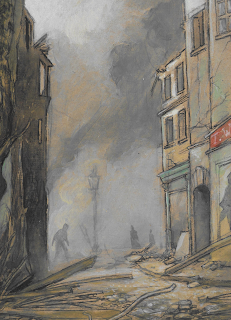Charles Williams (1886-1945) was a prolific and versatile writer and a member of the Inklings, the Oxford academic society that included Tolkien and Lewis. Unlike those two authors, however, Williams' work has never reached a very wide audience. He has won many admirers (among them the poet W.H. Auden), but his sophisticated religious and philosophical speculation is not for everyone. I confess I have always found him difficult. Put another way, I've finished two of his books and understood one of them. Possibly.
So it was with some trepidation that I approached this volume from Sarob, as it is a homage to Williams by John Howard and Mark Valentine. Both authors tackle aspects of Williams' work, which is informed by Christian ideas, often in surprising ways. The two novellas are very different, both in tone and content. Both are well-crafted, interesting, and arguably more accessible than Williams' own books.
John Howard's 'All the Times of the City' reminded me of All Hallows' Eve, Williams' last finished novel. That book is set in London in the immediate aftermath of World War 2, and concerns the destiny of two souls. In his story, Howard tells the story of two Londons, the modern city - complete with the Shard etc - and the bomb-damaged city of late1945. There is, however, a science fictional twist. The modern London is not the one we know. We know this because St. Paul's is described as an essentially medieval building that was repaired, not replaced, after the Great Fire of 1666.
Howard does a good job of world-building, offering us a corrupt, populist regime in his alternate Britain. (Where could have got that notion?) He also successfully evokes post-war London in 'our' history, where St. Paul's has its familiar dome, partly wrecked by the Luftwaffe but still standing. In 1945 the plot revolves around the work of a recently deceased writer, clearly a Williams figure, who somehow has the power to shift history onto the right track. But can this be achieved? The theme is essentially one of love and sacrifice, as the interplay of characters reveals the flaws and virtues of society, as embodied in the city.
Mark Valentine's novella 'Armed for a Day of Glory' is altogether lighter in tone but equally resonant in its treatment of paranormal themes. The setting is not specified but some references make it clear we are between the wars, in an era when magazine publishing still flourished. Letters to a journal entitled The Barograph concerning strange weather conditions lead the protagonist on a long and involving quest to uncover a conspiracy. It seems the ancient 'Talismans of Britain' are in danger, with a plan afoot to somehow disfigure the spiritual essence of the nation.






No comments:
Post a Comment